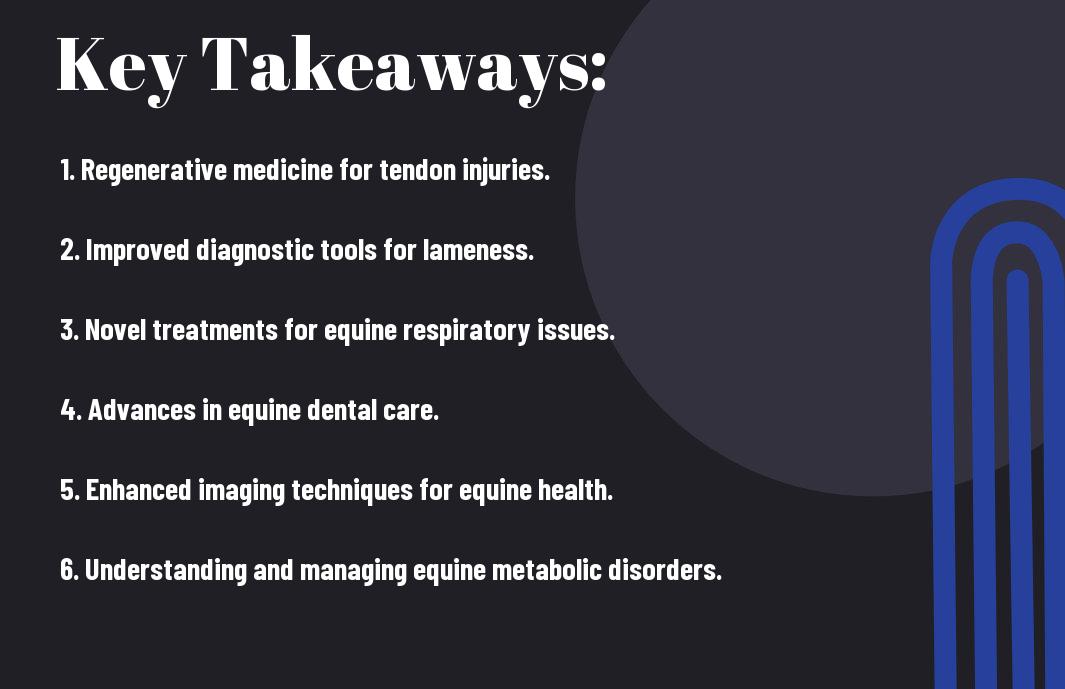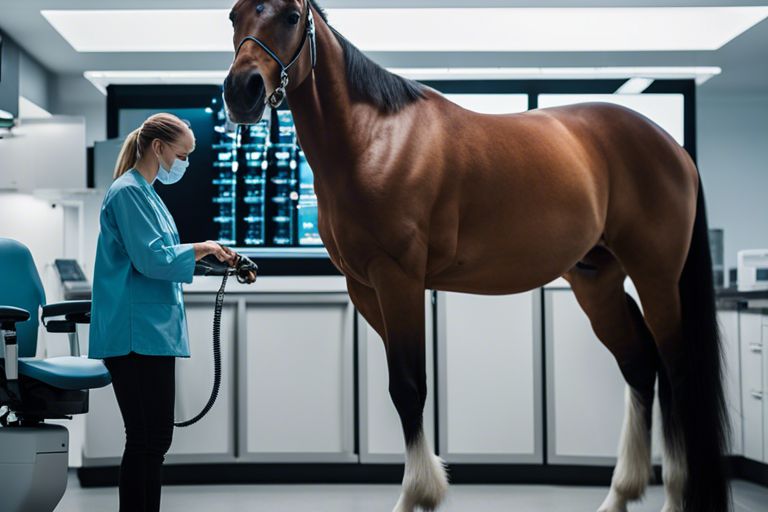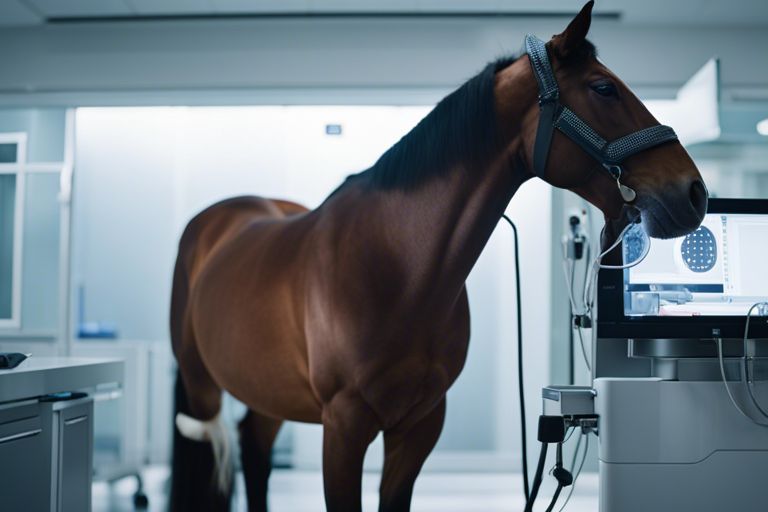It’s a fascinating time in the world of equine veterinary medicine, where cutting-edge technology and research are revolutionizing the way we care for our beloved horses. From advanced imaging techniques to gene therapy breakthroughs, the possibilities for improving equine health and performance are constantly expanding. In this blog post, you will discover some of the most exciting developments in the field and how they can benefit your horse’s well-being. So, saddle up and let’s explore the future of equine veterinary care together!


Advances in Diagnostic Techniques
While veterinary medicine has made incredible strides in recent years, one area that has seen significant advancement is diagnostic techniques. Accurate and timely diagnosis is crucial for effective treatment and management of equine health issues. Let’s explore some of the latest advances in this field.
Imaging Technologies
On your journey to understanding the latest in equine veterinary medicine, you will encounter groundbreaking imaging technologies that have revolutionized the way veterinarians diagnose and treat horses. MRI (Magnetic Resonance Imaging), CT (Computed Tomography) scans, and digital radiography are now widely available and provide detailed images of internal structures, allowing for more precise diagnoses of injuries and diseases. These non-invasive techniques are invaluable for identifying issues such as fractures, ligament damage, tumors, and neurological disorders.
Laboratory Testing
To research deeper into the health of your equine companion, laboratory testing has also seen significant advancements. Through blood tests, urine analysis, and genetic screenings, veterinarians can now detect infections, monitor organ function, and identify genetic predispositions to certain diseases. These tests provide valuable insights into your horse’s overall health and can help catch potential health concerns early on.
Another important aspect of laboratory testing is the development of point-of-care testing devices that allow for rapid on-site analysis of blood and other samples. These portable tools are particularly useful in emergency situations where quick diagnostic results can mean the difference between life and death for your beloved horse.

Breakthroughs in Surgical Procedures
Minimally Invasive Surgeries
With the advancement of technology in equine veterinary medicine, minimally invasive surgeries have revolutionized the way veterinarians approach surgical procedures on horses. These procedures involve smaller incisions, leading to reduced pain, faster recovery times, and decreased risk of complications for your equine companion.
Advanced Wound Care
Any equine owner knows that wounds can be a common occurrence in horses. However, with the latest advances in advanced wound care, veterinarians can now provide cutting-edge treatments to ensure your horse’s wounds heal quickly and effectively.
- Regenerative Medicine:
Pros Cons Stimulates tissue repair Costly - Vacuum-Assisted Closure (VAC) Therapy:
Pros Cons Reduces infection risk Requires specialized training
Plus, the use of regenerative medicine such as stem cell therapy can stimulate tissue repair on a cellular level, leading to significantly faster healing times. Vacuum-assisted closure (VAC) therapy is another major innovation in wound care, as it effectively reduces the risk of infection and promotes optimal healing conditions.
Developments in Medication and Treatment
Unlike conventional medications, targeted therapies are designed to specifically attack cancer cells without harming normal cells. This approach reduces side effects and improves the overall effectiveness of treatment. Targeted therapies work by blocking the growth and spread of cancer cells or by signaling the immune system to destroy them. In equine veterinary medicine, targeted therapies are being used to treat various types of cancers, including melanomas and lymphomas.
Targeted Therapies
An exciting development in equine veterinary medicine is the use of targeted therapies to treat cancer in horses. These medications can precisely target cancer cells, leading to more effective treatment and fewer side effects for your horse. By understanding the genetic makeup of the tumor, veterinarians can tailor treatment plans to target the specific vulnerabilities of the cancer cells, offering new hope for horses with challenging diagnoses.
Novel Drug Delivery Systems
Therapies that utilize novel drug delivery systems are revolutionizing equine veterinary medicine. These systems allow for precise and controlled release of medications, ensuring that the right amount of drug reaches the target area at the right time. This approach can improve treatment outcomes and reduce the risk of side effects for your horse. By encapsulating drugs in nanoparticles or liposomes, veterinarians can enhance drug stability and improve their ability to reach specific tissues or organs.
Innovations in Equine Rehabilitation
Now, let’s examine into the latest advances in equine rehabilitation. In this chapter, we will explore the innovative physical therapy modalities and alternative therapies that are transforming the way we care for our equine companions.
Physical Therapy Modalities
For your horse’s rehabilitation, there are several cutting-edge physical therapy modalities available. These include electrotherapy, hydrotherapy, and therapeutic ultrasound. Electrotherapy uses electrical stimulation to target specific muscles and promote healing. Hydrotherapy involves water-based exercises to improve strength and range of motion. Therapeutic ultrasound uses high-frequency sound waves to promote tissue healing and reduce inflammation.
Alternative Therapies
One of the alternative therapies gaining popularity in equine rehabilitation is acupuncture. Acupuncture involves the insertion of thin needles into specific points on the body to stimulate healing and relieve pain. This ancient practice has been shown to be effective in treating a variety of musculoskeletal issues in horses.
Understanding the benefits of these innovative physical therapy modalities and alternative therapies can enhance your horse’s rehabilitation journey, helping them recover faster and improve their overall well-being. Consult with your veterinarian to explore the best options for your horse’s specific needs.

Emerging Trends in Preventive Care
For
Vaccination Strategies
:
On the frontier of preventive care in equine veterinary medicine are the latest vaccination strategies. Vaccinations are crucial in protecting your horse against a range of diseases, some of which can be life-threatening. By staying up to date with the most recent advances in equine vaccines, you can ensure your horse’s immune system is primed to ward off these illnesses.
For
Parasite Control Methods
:
One of the key aspects of preventive care for horses is controlling parasites. Parasites can wreak havoc on your horse’s health, causing a range of issues from poor coat condition to colic. Implementing **strong** parasite control methods is necessary to keep your horse healthy and thriving. Regular deworming schedules tailored to your horse’s specific needs, along with pasture management practices, are vital components of an effective parasite control strategy.
Another important aspect of parasite control is conducting regular fecal egg counts to **strong** monitor the effectiveness of your deworming program. By working closely with your veterinarian to develop a comprehensive parasite control plan, you can **strong** safeguard your horse against these insidious invaders.
The Role of Technology in Equine Healthcare
Despite the traditional image of a veterinarian with stethoscope in hand, modern equine healthcare is increasingly relying on technology to enhance the quality of care provided to your horses. Technology is revolutionizing the way veterinarians approach diagnosis, treatment, and monitoring of equine health issues.
Telemedicine and Remote Monitoring
Healthcare in the equine world has been significantly improved by the advent of telemedicine and remote monitoring. Through video consultations and advanced monitoring devices, veterinarians can assess your horse’s condition in real time from a distance. This can be especially beneficial in emergencies or situations where transportation of a sick or injured animal may be challenging.
Data Analytics and Artificial Intelligence
Monitoring the vast amounts of data generated in equine care is a daunting task, but with the help of data analytics and artificial intelligence, veterinarians can now sift through this information more efficiently. By utilizing algorithms and machine learning, patterns can be identified, leading to quicker and more accurate diagnoses. This can ultimately save lives by predicting and preventing potential health issues before they become critical.
Final Words
Conclusively, staying informed about the latest advances in equine veterinary medicine is imperative for any horse owner or enthusiast. By keeping up-to-date with new treatments, technologies, and practices, you can ensure that your equine companion receives the best care possible. Whether it’s learning about new surgical techniques, diagnostic tools, or preventative measures, staying informed will help you make informed decisions about your horse’s health and well-being. Keep in mind, knowledge is power when it comes to caring for your four-legged friend.
FAQ
Q: What are some of the latest advances in equine veterinary medicine?
A: Some of the latest advances in equine veterinary medicine include regenerative therapies such as stem cell therapy and platelet-rich plasma (PRP) therapy, advanced imaging techniques like MRI and CT scans, and minimally invasive surgical procedures.
Q: How do regenerative therapies like stem cell therapy benefit horses?
A: Regenerative therapies like stem cell therapy can help horses recover from injuries faster by promoting tissue repair and reducing inflammation. They can also be used to treat conditions such as osteoarthritis and tendon injuries.
Q: What are some benefits of advanced imaging techniques in equine veterinary medicine?
A: Advanced imaging techniques like MRI and CT scans allow veterinarians to obtain detailed images of a horse’s internal structures, helping them make more accurate diagnoses and create tailored treatment plans. This can greatly improve outcomes for equine patients.
Q: How do minimally invasive surgical procedures benefit horses?
A: Minimally invasive surgical procedures, such as arthroscopy and laparoscopy, offer several advantages for horses, including shorter recovery times, reduced risk of complications, and smaller incisions. These procedures are often less painful for the horse and allow for quicker return to normal activity.
Q: Are there any emerging technologies in equine veterinary medicine to keep an eye on?
A: Yes, there are several emerging technologies in equine veterinary medicine to keep an eye on, including 3D printing for creating custom implants, telemedicine for remote consultations, and wearable technology for monitoring horses’ health and performance.











